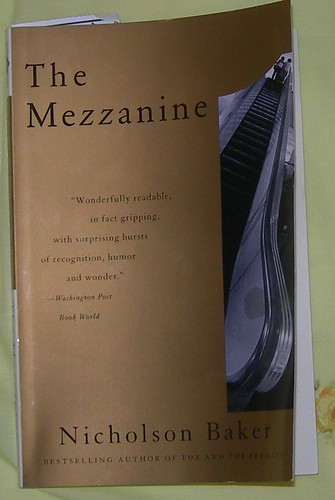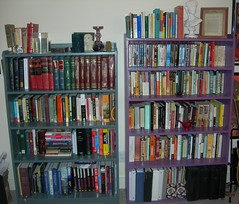133pp
07/03/07 - 07/14/07
After reading four consecutive 2007 books, I plumbed the depths of history with this 1988 "novel." There's a peculiar kind of psychic reversion that occurs when reading literature from my childhood--specifically, in the infancy of my awareness of the cultural stew in which I found myself immersed (ie, age 8)--that is very much "of its time." This particular book felt like time traveling to a simpler time, even though the notion of 1988 as "a simpler time" is still a novel concept (to me, at least. I am still reluctant to acknowledge that there are people in this world for whom 1988 is a hazy memory at best).
I guess this book is a little notorious (though perhaps not as notorious as the Baker novel Monica gave Bill, which Steven King likened to "meaningless little fingernail paring") as "the many-footnoted novel about a one-story escalator ride." This is an apt nutshell insofar as the book is concerned with minute and discursive observations, with practically no action. Still, though, I take some issue with that summary: we get a pretty full account of the events of the narrator's morning, and anyway, we hear very little about the escalator ride itself.
So it's a book of meditations on some of the more minute, quotidian aspects of modern life. The narrator happens to be in the middle of a Penguin Classics paperback edition of Marcus Aurelius' Meditations, a quote from which pretty much forms this books thesis: "Manifestly, no condition of life could be so well adapted for the practice of philosophy as this in which chance finds you today!" Thus the narrator, finding himself in a late-eighties office building, proceeds to philosophize thereupon.
Which makes for surprisingly compelling reading. Baker seems to have genuine reverence for the well-engineered consumer products that fill our lives, and he has an amazing knack for bringing poetry from the modern living condition. The escalators in question, for instance, are "a pair of integral signs swooping upwards between the two floors they served." This is paired with a keen, obsessive eye for detail. E.g., we're treated to the histories of milk cartons and drinking straws, and the minute little changes they've gone through during the narrator's lifetime, and he agonizes over the alternative designs eschewed by their manufacturers. The act of stapling, we are told, is a three phase act. Sociological implications of familiar brands and products are likewise commented on; CVS is "a whole chain dedicated to making available the small, expensive, highly specialized items that readied bodies for human civilization...Things were for sale whose use demanded nudity and privacy."
I, for one, would love to read a whole lot more writing in this vein. We all live in a world populated by exponentially more consumer products than people, but our primary vehicle for observation about these things (as opposed to people) seems to be bad standup. ("Airline peanuts are weird...") God knows this kind of writing is nothing new. Baker uses 133 pages to explore a few minutes of an office worker's inner life; Joyce spent several hundred pages to describe a day in Leopold Bloom's life in far less detail. Such writing has a certain evanescent appeal: though I had to consult Ulysses Annotated to read about "Plumtree's Potted Meat," I am more than familiar with, say, Kiwi shoe polish. Reading about familiar brands and products is more than just an interesting exercise in deriving meaning from the overlooked everyday world, it's comforting.

I considered going to the former Sid & Marty Krofft amusement park site (AKA, "CNN Center") to, as an homage to this book, take a ride on the world's longest freestanding escalator. I didn't get around to doing this, but I did have a few occasions to ride the Peachtree Center MARTA escalator: longest, steepest escalator in the Southeast. (Atlanta Tourism Board! Pls contact me re: proposed "Atlanta: City of Escalators" promotional campaign! This is your final notice.)

No comments:
Post a Comment